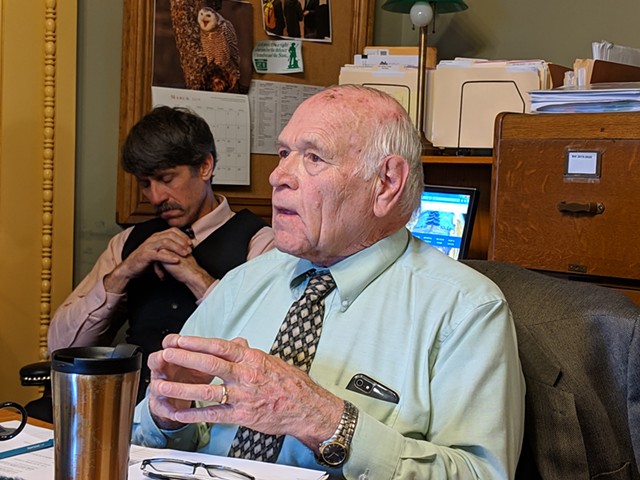
- Taylor Dobbs
- Sen. Dick Sears speaks as Sen. John Rodgers, in back, looks on
Updated at 2:08 p.m.
After a bitter debate Friday morning, the Senate Judiciary Committee narrowly approved a compromise bill proposed by Sen. Dick Sears (D-Bennington) that would require a 24-hour waiting period for handgun sales in Vermont.
The measure is a scaled-back version of a bill introduced by Sen. Phil Baruth (D/P-Chittenden), who wanted a 48-hour waiting period for all gun sales. His proposal had support from the family of 23-year-old Andrew Black, an Essex man who shot and killed himself in December, hours after purchasing a gun.
Baruth, who sits on the five-member Judiciary Committee, was unable to find two allies for his proposal. Instead, he signed on to Sears' compromise, which still needed support from one more committee member in order to pass.
The bill would create penalties of a $500 fine or up to one year in prison for people who turn over a handgun to a buyer less than 24 hours after completing a background check for the purchase.
Sears said he introduced his compromise proposal for a 24-hour ban after hearing testimony from a wide range of experts, including emergency room doctors and gun shop owners. He read an excerpt of a letter from one gun seller who wrote in opposition of waiting periods.
“Many of our sales are impulse buys,” Sears read from the letter. “A 48-hour waiting period pretty much puts an end to the impulse buy.”
Sears said the letter was convincing, but not in the way its author intended.
“I realize he was trying to tell me not to vote for the bill, but by the same token, he’s saying many of his sales are impulse buys,” Sears said.
The senator also pointed to testimony from Dr. Rebecca Bell, a pediatric critical care physician from the University of Vermont Medical Center. She told the committee that contrary to popular belief, people who are suicidal do not simply find any means necessary to kill themselves in the absence of a gun.
“The ‘inevitability myth’ that says a person with suicidal ideations will just find a way is particularly damaging,” Sears read from Bell’s testimony. “Ninety percent of those who survive near-lethal suicide attempts do not go on later to die by suicide.”
Sens. Jeanette White (D-Windham), Joe Benning (R-Caledonia) and Alice Nitka (D-Windsor) questioned whether it’s the responsibility of state government to intervene if a person decides to end their own life.
Benning, who said he’s lost multiple friends to suicide-by-handgun, compared suicide prevention efforts to government interference in women’s right to choose an abortion.
“I know this may sound, at first blush, as if it’s coming out of left field, but the fundamental right of an individual to control their bodies and make decisions about their bodies is something I’m very attuned to,” Benning said. “And as crazy as this may sound, if I decide to commit suicide, what right does the state of Vermont have to try to intercede because somebody around this table feels, ‘Well, that’s tragic’?”
Nitka agreed. Pointing to Vermont’s 2013 law that allows patients with terminal illnesses to receive a prescription for a fatal dose of drugs, she suggested those patients should have same the right to buy a gun and shoot themselves.
“We keep hearing the statistics about suicide. Very sad,” Nitka said. “But in fact, it’s not sad when someone who is suffering from cancer simply ends their life — decides on their own they will kill themselves by their own means and decides to shoot themself. And even though we allow people to commit suicide via death with dignity or whatever we call it now, we allow them to do it. And just because someone chooses a different method doesn’t mean that that’s not their choice to do.”
Nitka said she knew multiple people with late-stage cancer who had shot and killed themselves.
The deciding yes vote came from White, who admitted that she was conflicted about whether the state should intervene in cases of suicide.
“I do think that if somebody is in that situation [with a terminal illness], or they think about it for a long time, I’m not sure we have a right to tell them that we know best for them,” White said.
But her decision was influenced by the story of a friend’s son, who she described as a “really happy kid.”
“He went out that night and it was slippery and he wrecked his mom’s new car,” White said, “and he was really bummed out about that and he thought she was going to yell at him. He went to his very favorite place … the top of a mountain right near my house.”
After a morning of heated exchanges in which senators spoke over each other, White’s story brought a sense of quiet to the room. There were no side-conversations or raised hands from other senators waiting to get a word in.
“It was a beautiful January night. The moon was out. There was this little cabin there on the top of the hill. And there was a rope hanging there, and he hung himself,” White said. “I know that he had not thought about that before.”
She said a waiting period for handgun purchases could prevent similarly impulsive suicides.
“If we have a short waiting period, it might …” White said, trailing off. “I believe that if an
owl had hooted right then, that he would have been jolted out of that. But I will never know that.”
Benning and Nitka voted against the bill.
Benning voiced concern about passing legislation that would make it harder for domestic violence victims to buy guns immediately after a breakup. Plus, he pointed out that it’s unknown how many suicides-by-firearm in Vermont took place within 24 hours of the gun’s purchase.
“We have a speculative bill that might reduce suicides, and that’s the hope. But it comes at the expense of others we have seen fit to try to protect with legislation that we all worked very hard on,” Benning said, referring to last year’s law that created Extreme Risk Protection Orders, which allow police to take guns away from people after a court order finds them to be a threat to themselves or others.
Nitka said she thought it was a “good bill” but that she lost faith in the legislative process last year when House lawmakers amended Senate-approved legislation to include the ban on high-capacity magazines. That proposal did not go through the usual committee process. Concerned that the proposal would be amended later by other lawmakers, Nitka voted no.
“Given the future of this bill in the Senate and the House, I can’t support it because it’s too risky,” she said.
The committee added two other provisions to the bill, both related to gun laws the legislature passed last year.
One would allow high-capacity magazines for use at shooting competitions. The other would require state officials to collect information about the use of Extreme Risk Protection Orders. The committee said lawmakers want more information about how those orders are being used within the justice system.
After Friday's 3-2 committee vote, the legislation is expected to advance to the full Senate next week.
















Comments (12)
Showing 1-12 of 12
Comments are closed.
From 2014-2020, Seven Days allowed readers to comment on all stories posted on our website. While we've appreciated the suggestions and insights, right now Seven Days is prioritizing our core mission — producing high-quality, responsible local journalism — over moderating online debates between readers.
To criticize, correct or praise our reporting, please send us a letter to the editor or send us a tip. We’ll check it out and report the results.
Online comments may return when we have better tech tools for managing them. Thanks for reading.